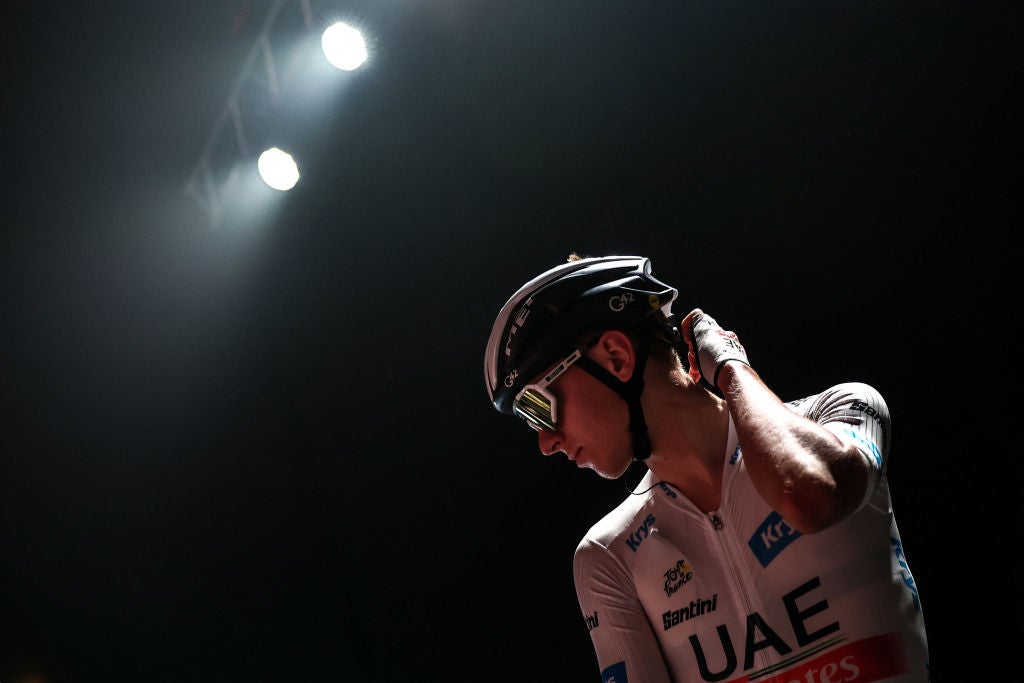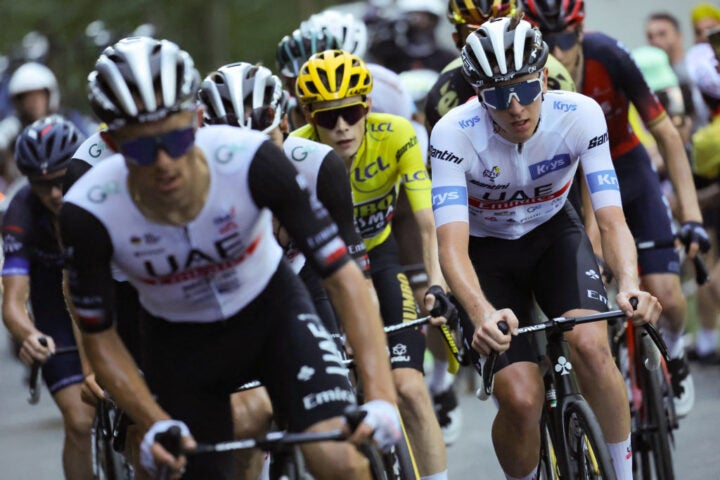
Artikel
08
januari
Is Artificial Intelligence the Next Maximal Gain? How UAE Emirates Is Betting on ‘Big Data’
UAE Team Emirates is going all-in on artificial intelligence in its quest to conquer the Tour de France.
The team of Tadej Poga?ar is gambling that a deep dive into “big data” will uncover an unseen dimension of performance insight that will help it dethrone Jonas Vingegaard and Visma-Lease a Bike in 2024 and beyond.
“There’s definitely going to be a breakthrough from the use of A.I. in coming years,” UAE Emirates’ performance coordinator Jeroen Swart told Velo.
“We’re now working with an A.I. partner to trawl through huge amounts of training and performance data and other variables we can input to assess which factors give the biggest bang for the buck. We’re looking at training protocol, race selections, all sorts.”
Also read:
- UAE Emirates plans to win it all in 2024
- Carb revolutions, baking soda supplements, and more: How pro cycling got faster in 2023
Can A.I. help build Poga?ar the perfect training program or race schedule that will return him to the top of the Tour de France?
UAE Team Emirates can only wait and see.
“It might not bring up much, but really investing into A.I. could show us the next step forward,” Swart said. “We just won’t know what that might be until we see it and experience it.”
‘A.I. analysis could reveal anything’

Whether you like it or not, it seems that artificial intelligence is the future of all things.
And the story’s the same in the world of pro cycling.
From bike design and time trial profiling to calorie calculations and even team selections, “big data” is blowing fresh insight into the boardrooms of the WorldTour.
UAE Emirates has now partnered with Emirati A.I. whizz kids and Formula 1 collaborators Presight to find what moves the needle in terms of training methodologies.
“We have our traditional and evidence based understanding of which factors are important in training, racing, and nutrition etc,” Swart said.
“But when we feed all of that into an A.I. system, it’s likely to start identifying other variables or other patterns that we may not have considered in the past. And that may give some novel insight that could unlock performance in certain athletes.”
Chris Armstrong, @mercedesamgf1 Wellbeing Programme Manager, explores the increasingly important role data plays in monitoring the mental and physical wellbeing of all employees to drive high performance.#G42 #Presight #bigdataanalytics #AI #DigitalTransformation pic.twitter.com/10pKwedzYp
— Presight (@PresightAI) November 10, 2023
What could artificial intelligence do for a rider’s fitness and form that a few hard interval sessions or big-mile training camp could not?
“A.I. analysis could reveal anything. There could be insights we’ve not considered,” Swart said in a recent call.
“That’s the beauty of A.I., it doesn’t have any preconceived notions – it takes the data and it analyses it and it spits out a bunch of answers, and then you look at those and say, ‘does this make sense, is this real?’, then you go and test it,” he said.
“And if you test it and find something real then you know you’ve found something new.
The ‘big data’ boom

UAE Emirates isn’t the first team to use “big data”.
In fact, it’s a practice that’s been around since before the Poga?ar era. Forward-thinking squads like Visma-Lease a Bike, Ineos Grenadiers, and Israel-Premier Tech have been riding the big data boom for the past few seasons.
Visma’s “Food Coach” app, Ineos’ time trial optimisation, and IPT’s roster selections are founded in huge data sets and mind-scrambling algorithms. Israel-Premier Tech’s trainer Paulo Saldana even helped author a study into how data modelling can enhance coaching decisions.
And of course, there’s no doubt that every bike, helmet, and skinsuit can thank statistical super-analysis for making it that bit faster.
“A lot of performance scientists are heading down the direction of A.I. now,” said James Spragg, physiologist and coach at Tudor Pro Cycling.
“When we, humans, conduct studies now, we start with a hypothesis we’re looking to prove. But artificial intelligence works totally differently. It approaches things with no bias and looks at how potentially random things can be grouped,” Spragg told Velo. “It’s got a huge amount of potential.”
Unraveling the data-driven revolution in Cycling means understanding how it continues to evolve each season. @AdamYates7, David Herrero, and @Macaharvey explore the remarkable influence of data in creating today’s champions. #UAETeamEmirates #WeAreUAE #G42 pic.twitter.com/Cp3jmG7aEo
— @UAE-TeamEmirates (@TeamEmiratesUAE) October 25, 2023
Trainers, nutritionists, and sport directors are holding their breath at what could be discovered when a supercomputer starts scouring seasons’ worth of stats.
From unforeseen training combinations and stimuli to the timing of an off-season or taper, the performance world is there to be computed by the increasingly sophisticated algorithms of machine learning.
“Things are moving so fast with A.I., and it seems so much is possible with it,” Spragg said. “As coaches, we probably wouldn’t be doing our due diligence if we weren’t looking in that direction.”
Will A.I. ‘push the boundaries of human capabilities and endurance’?

UAE Emirates is going all-in on A.I. as it looks for any helpful half-percent.
Pogi’s posse and its partner Women’s WorldTour team UAE ADQ are now using an “operational wellness and performance dashboard” provided by its Presight tech partner.
“Cyclists’ physiological metrics, environmental conditions, and race histories are crunched to tailor training routines and nutrition plans, pushing the boundaries of human capabilities and endurance,” read a statement from Presight.
“Our partnerships with UAE Team Emirates and UAE Team ADQ enable the teams with better decision-making based on the intelligence gained from our data analytics platform.”
How exactly will Presight help UAE Emirates deliver Poga?ar, Adam Yates, or Juan Ayuso into the maillot jaune this summer?
Like both Swart and Spragg said, nobody will know until the robots reveal it.
What's your reaction ?
Follow us on Social Media
Some Categories
Recent posts

July 24, 2024
Navigating AI Implementation: Try these strategies to overcome resistance.

July 24, 2024
Sick Leave Policy Netherlands Guidance for HR and Entrepreneur.

July 24, 2024
CSRD Reporting: Mandatory Reporting on Corporate Sustainability.

July 24, 2024
Training Budget: Investing in Employee Development.

July 24, 2024
9 Reasons Why Small Businesses Should Outsource HR.

 Inloggen
Inloggen
 Registreren
Registreren






Comments (0)
No reviews found
Add Comment